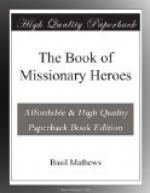He travelled through deep ravines and over high mountain passes and across vast plains. His head ached till he felt it would split; he could not eat; fever came on. He shook with ague. Yet his remorseless Turkish guide, Hassan, dragged him along, because he wanted to get the journey over and go back home.
At last one day Martyn got rest on damp ground in a hovel, his eyes and forehead feeling as though a great fire burnt in them. “I was almost frantic,” he wrote. Martyn was, in fact, dying; yet Hassan compelled him to ride a hundred and seventy miles of mountain track to Tokat. Here, on October 6th, 1812, he wrote in his journal:
“No horses to be had, I had an unexpected repose. I sat in the orchard and thought with sweet comfort and peace of my God—in solitude my Company, my Friend, my Comforter.”
It was the last word he was ever to write.
Alone, without a human friend by him, he fell asleep. But the book that he had written with his life-blood, the Persian New Testament, was printed, and has told thousands of Persians in far places, where no Christian man has penetrated, that story of the love of God that is shown in Jesus Christ.
FOOTNOTES:
[Footnote 62: See Chapter XXIII.]
CHAPTER XXV
THE MOSES OF THE ASSYRIANS
William Ambrose Shedd
(1865-1918)
I
A dark-haired American with black, penetrating eyes that looked you steadily in the face, and sparkled with light when he laughed, sat on a chair in a hall in 1918 in the ancient city of Urumia in the land of Assyria where Persia and Turkey meet.
His face was as brown with the sunshine of this eastern land as were the wrinkled faces of the turbaned Assyrian village men who stood before him. For he was born out here in Persia on Mount Seir.[63] And he had lived here as a boy and a man, save for the time when his splendid American father had sent him to Marietta, Ohio, for some of his schooling, and to Princeton for his final training. His dark brown moustache and short beard covered a firm mouth and a strong chin. His vigorous expression and his strongly Roman nose added to the commanding effect of his presence.
A haunting terror had driven these ragged village people into the city of Urumia, to ask help of this wonderful American leader whom they almost worshipped because he was so strong and just and good.
For the bloodthirsty Turks and the even more cruel and wilder Kurds of the mountains were marching on the land. The Great War was raging across the world and even the hidden peoples of this distant mountain land were swept into its terrible flames.




